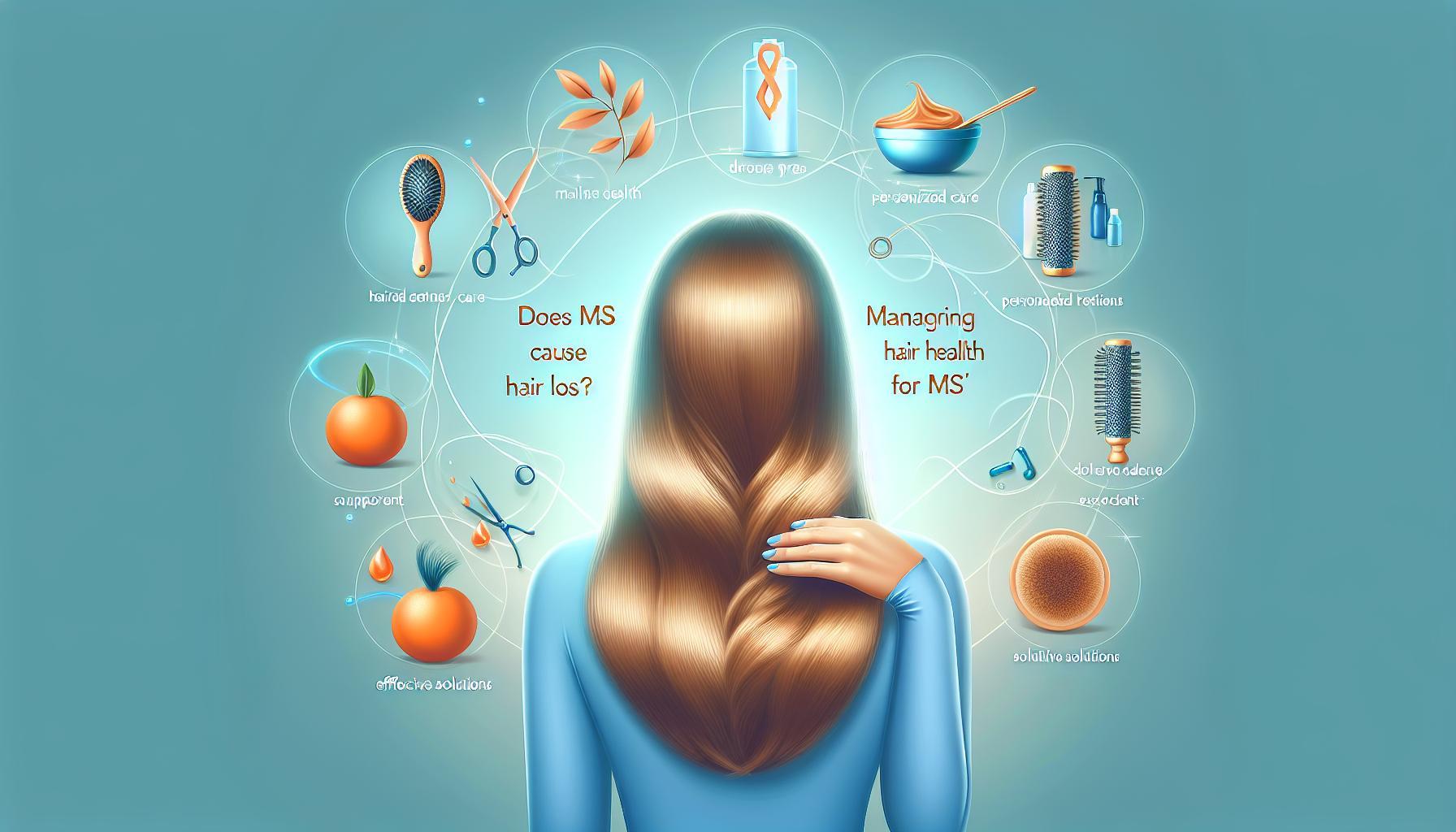Living with multiple sclerosis can bring many uncertainties, including potential changes to hair health. Understanding whether MS contributes to hair loss is crucial for those navigating thes challenges. This article explores the relationship between MS and hair thinning, while offering practical strategies to maintain vibrant, healthy hair amidst the journey.
Contents
- Understanding Multiple Sclerosis and Its Impact on Hair Health
- The Link Between MS Symptoms and Hair Loss: What You Need to Know
- nourishing Your Hair: essential Nutrients for Managing Hair Health with MS
- Effective Hair Care Routines for Individuals living with MS
- Emotional Well-being and hair Loss: Coping Strategies for MS Patients
- Exploring Treatment Options: What Works for Managing Hair Loss with MS
- Styling Tips and Tricks: Embracing Your Hair Journey with MS
- FAQ
- Does MS cause hair loss?
- What are the common causes of hair loss in MS patients?
- Can I manage hair loss caused by MS?
- Why does MS lead to changes in hair health?
- What are the best hair care practices for individuals with MS?
- Can diet help prevent hair loss in MS patients?
- Is hair loss from MS temporary or permanent?
- To Wrap It Up
Understanding Multiple Sclerosis and Its Impact on Hair Health
Research indicates a notable connection between multiple sclerosis (MS) and various aspects of physical health, including hair health. Many individuals diagnosed with MS experience changes in their hair texture,thickness,and overall vitality,leading to a common question: does MS cause hair loss? While the medical community continues to explore the nuances of this relationship,patients and caregivers can benefit from understanding the underlying factors that contribute to hair health in the context of MS.
One significant factor in the potential for hair loss among those with MS is the autoimmune nature of the disease. MS leads to the immune system erroneously attacking the myelin sheath surrounding nerve cells, which can indirectly influence overall health, including hair growth cycles.Stress, a frequent companion of chronic illnesses, also plays a crucial role.Not only does the psychological stress of living with MS affect mental health, but it can also trigger telogen effluvium—a temporary form of hair loss caused by stress, illness, or hormonal changes.
Factors Affecting Hair Health in MS
- Medications: Various treatments for MS, including corticosteroids and disease-modifying therapies, can impact hair health. Side effects may include hair thinning or increased shedding.
- Nutritional Deficiencies: MS can lead to malabsorption issues or dietary limitations, resulting in deficiencies in essential nutrients like iron, zinc, and biotin, all of which are vital for healthy hair.
- Hormonal Changes: Fluctuations in hormone levels due to stress or hormonal therapies might also contribute to changes in hair growth.
to manage hair health effectively while living with MS, it is indeed essential to adopt a holistic approach that addresses both mental and physical well-being. Here are some actionable steps:
- Consultation with Healthcare Providers: Regularly discuss any changes in hair health with your healthcare team, including neurologists and dermatologists, to understand potential underlying causes and treatment options.
- Balanced Diet: Focus on a well-rounded diet rich in vitamins and minerals. Consider foods high in omega-3 fatty acids,lean proteins,vitamins A,C,D,and E,and minerals like iron and zinc. Supplements may also be beneficial but should be discussed with a doctor.
- Stress Management: Techniques such as yoga, meditation, and mindfulness can help reduce stress levels. Finding supportive communities, whether online or in person, can also alleviate feelings of isolation that often accompany chronic conditions.
- Gentle hair Care Practices: Avoid harsh chemicals and treatments. Opt for mild shampoos and conditioners and reduce heat styling to protect hair integrity.
By understanding the multifaceted relationship between MS and hair health, patients can take proactive steps to mitigate hair loss as part of a comprehensive management strategy.Addressing this issue holistically not only enhances physical appearance but also contributes positively to overall quality of life for those navigating the challenges of multiple sclerosis.
The Link Between MS Symptoms and Hair Loss: What You Need to Know
Understanding the relationship between multiple sclerosis (MS) symptoms and hair loss can be crucial for those navigating the complexities of the condition. While many individuals with MS focus primarily on the neurological effects of their illness, hair loss can emerge as another poignant challenge, often compounding the emotional toll of the disease. The interplay between MS and hair health is far from straightforward, as several factors contribute to this distressing symptom.
Common Causes of Hair Loss in MS patients
Individuals living with MS may experience hair loss due to a variety of reasons, including:
- Autoimmune Response: MS is itself an autoimmune disorder, where the body mistakenly attacks its own tissues. This immune dysfunction can extend to hair follicles, perhaps leading to thinning or loss.
- Medication Side Effects: Treatments for MS, such as beta interferons or corticosteroids, can result in adverse effects including hair thinning. Understanding which medications impact hair health can help manage expectations.
- Stress and Fatigue: The physical and emotional stress associated with living with MS can precipitate episodes of telogen effluvium, a condition where hair temporarily falls out due to stressors.
- Nutritional Deficiencies: MS can lead to changes in appetite or difficulties with digestion, contributing to deficiencies in essential vitamins such as B12, D, and iron, all known to support healthy hair growth.
Managing Hair Health with MS
Fortunately, there are actionable steps that those with MS can take to manage their hair health effectively:
| Step | Action |
|---|---|
| 1 | Consider a balanced diet rich in vitamins and minerals.Foods high in omega-3 fatty acids, iron, and biotin can support both hair and overall health. |
| 2 | Consult with healthcare providers about the potential hair loss side effects of medications, and explore option treatments if necessary. |
| 3 | Incorporate stress management techniques such as yoga, meditation, or counseling to mitigate the emotional strain that coudl lead to hair loss. |
| 4 | Use gentle hair care products that are free from harsh chemicals, as these can exacerbate thinning hair. |
Understanding the connections between MS symptoms and hair loss enables individuals to take proactive measures. By addressing the underlying causes, seeking proper treatment, and making lifestyle adjustments, those living with MS can enhance their overall well-being and hair health. Recognizing that hair loss is a multifaceted issue will equip individuals with the knowledge and tools needed for effective management.
nourishing Your Hair: essential Nutrients for Managing Hair Health with MS
When living with multiple sclerosis (MS), maintaining hair health can often feel like an uphill battle. Not only does MS directly impact the central nervous system, leading to a myriad of physical symptoms, but it can also contribute to emotional stress, which is further exacerbated by challenges like hair loss. Understanding the role of nutrition in supporting hair health can empower you to take actionable steps toward minimizing hair loss and promoting regrowth.
To nourish your hair from the inside out, certain key nutrients play a vital role. Below are essential nutrients beneficial for managing hair health,especially relevant for individuals navigating the complexities of MS:
Essential Nutrients for Hair Health
- Protein: Hair is primarily made of a protein called keratin.Ensuring adequate protein intake is crucial for hair growth. Sources include lean meats, fish, eggs, and legumes.
- Iron: A deficiency in iron can lead to hair loss, as it is crucial for delivering oxygen to hair follicles. Iron-rich foods include spinach, red meat, and lentils.
- Omega-3 Fatty Acids: These healthy fats nourish hair and promote a shiny appearance. Incorporate sources like salmon, walnuts, and flaxseeds into your diet.
- Vitamins A and C: Both vitamins are crucial for producing sebum, the natural oil that helps keep hair moisturized. Get these vitamins from carrots, sweet potatoes, citrus fruits, and bell peppers.
- Biotin: This B-vitamin is often touted for its role in hair health. You can find biotin in eggs, nuts, and whole grains.
For those wondering about the connection between MS and hair loss, it’s important to consider that proper nutrition may not only mitigate some adverse effects but also foster a sense of control over your health. A balanced diet rich in these hair-nourishing nutrients can support not only hair regrowth but overall wellness, which is essential for individuals managing multiple sclerosis.
Consider keeping a food diary to track your nutrient intake, or consult with a nutritionist who specializes in MS. by making intentional choices about what you eat, you are taking significant steps towards improving both your hair health and overall quality of life. Embracing this holistic approach can help you feel empowered and resilient on your journey with MS.
Effective Hair Care Routines for Individuals living with MS
Hair care can often become a challenging aspect of daily life, especially for those managing multiple sclerosis (MS). It’s well-documented that individuals living with this condition may experience hair loss due to various factors,including medication side effects,stress,or the illness itself. But fear not—there are effective hair care routines that prioritize scalp health and nurture your locks, allowing you to maintain a vibrant appearance despite the hurdles.
Developing a Gentle Cleansing Routine
A consistent cleansing routine is crucial for maintaining hair health. Here are some recommendations to keep in mind:
- Choose sulfate-free shampoos: Opt for gentle, sulfate-free shampoos that won’t strip your hair of its natural oils.
- Limit washing frequency: Depending on your hair type, washing your hair two to three times a week may be sufficient to keep your scalp healthy.
- Use lukewarm water: Hot water can exacerbate dryness—stick to lukewarm temperatures instead.
Consider creating a personalized washing schedule that fits your lifestyle and adheres to how your scalp reacts. For instance, if you notice more hair falling out after cleansing, it might be beneficial to wash less frequently.
Scalp Care and Moisturization
Caring for your scalp is just as important as caring for your hair. A healthy scalp contributes considerably to healthy hair growth. To enhance scalp care:
- Moisturize regularly: Use oils such as coconut or argan oil to massage into your scalp—this can stimulate blood circulation and hydration.
- Consider natural ingredients: Products with tea tree oil or aloe vera can soothe irritation and support scalp health.
- Exfoliate occasionally: Scalp exfoliants can help remove dead skin cells, promoting a healthier environment for hair growth.
When developing your scalp care routine, remember that consistency is key. A weekly or biweekly exfoliation can make a notable difference over time.
Nourishing the Hair
Incorporating nourishments into your hair care regimen can help combat hair loss and promote strength. Here are some nutrients and practices to consider:
- Protein treatments: Regular protein treatments can fortify weak hair strands. Look for treatments designed for your hair type.
- Balanced diet: Ensure your diet is rich in vitamins and minerals crucial for hair health, including vitamins A, C, D, E, iron, and omega-3 fatty acids.
- Stay hydrated: Drinking plenty of water is essential for overall health, including hair health. Aim for at least eight glasses a day.
A well-rounded diet not only benefits your hair but also supports your overall well-being, which can be especially critically important for those managing MS.
| Essential nutrients | Benefits for Hair Health | Food Sources |
|---|---|---|
| Vitamin A | promotes sebum production to keep hair moisturized | Carrots, sweet potatoes, spinach |
| Vitamin E | Helps maintain healthy hair follicles | Nuts, seeds, avocado |
| Iron | Supports circulation and oxygen supply to hair follicles | Legumes, red meat, leafy greens |
| Omega-3 Fatty Acids | Strengthens hair and adds shine | salmon, flaxseeds, walnuts |
By understanding the implications of MS and its potential impact on hair loss, alongside adopting effective hair care routines, individuals can embrace their unique beauty and boost their confidence. Whether through gentle cleansing, nourishing treatments, or a healthy diet, there are actionable steps to mitigate hair loss and promote a lively mane.
Emotional Well-being and hair Loss: Coping Strategies for MS Patients
Experiencing hair loss can be a significant concern for individuals living with multiple sclerosis (MS), impacting not only physical appearance but also emotional well-being.research indicates that emotional well-being plays a crucial role in managing the effects of chronic illnesses like MS. The anxiety and stress associated with hair loss can exacerbate feelings of vulnerability, leading to a cycle of distress that can hinder overall quality of life. emotional well-being encompasses a person’s ability to cope with life’s challenges, and for those facing the dual challenges of MS and hair loss, cultivating resilience is essential.
Practical Coping Strategies
to navigate the emotional turmoil associated with hair loss, MS patients can adopt several strategies that promote emotional health and resilience:
- Support Networks: Engaging with support groups, either in-person or online, provides a safe space for sharing experiences and emotions related to MS and hair loss. Talking with others facing similar challenges can foster a sense of community and reduce feelings of isolation.
- Mindfulness and Relaxation Techniques: Practicing mindfulness through meditation, yoga, or deep-breathing exercises can definitely help manage stress and improve emotional well-being. These techniques encourage individuals to stay present and develop a more positive mindset.
- Professional Counseling: Seeking therapy from a licensed professional can equip MS patients with coping skills and provide an outlet for discussing feelings about hair loss and its impact on self-esteem.
- Expressive Writing: Journaling feelings related to hair loss and MS can serve as a form of emotional release, helping individuals articulate their thoughts and reflect on their experiences.
Self-Care and Hair Health
Maintaining a focus on self-care is vital for preserving both hair health and emotional well-being. Patients can consider incorporating nourishing hair care routines along with healthy lifestyle choices, which may include:
| Activity | benefits |
|---|---|
| Balanced Diet | Supports overall health and may promote healthier hair growth. |
| Regular Exercise | Releases endorphins, which can improve mood and reduce anxiety. |
| Hydration | Keeps the body and hair hydrated, potentially aiding in hair health. |
| Limiting Stress | Using stress-reduction techniques to alleviate hair loss anxiety. |
By implementing these coping strategies, individuals dealing with MS and hair loss can enhance their emotional resilience. It’s essential to recognize that addressing emotions tied to physical changes is not just beneficial for mental health but is also a crucial component of managing overall well-being. In navigating the effects of MS and potential hair loss, focusing on emotional health can lead to a better quality of life and a more positive frame of mind.
Exploring Treatment Options: What Works for Managing Hair Loss with MS
Understanding the interplay between multiple sclerosis (MS) and hair loss opens a door to addressing an often overlooked aspect of health for those affected by this condition. While not everyone with MS experiences hair loss, those who do may find it a frustrating and emotionally challenging side effect. Fortunately, various treatment options exist that can help manage this issue, improving not only the appearance of hair but also overall wellbeing.
Types of Treatments for Hair Loss Associated with MS
When it comes to managing hair health among MS patients, the approach can be both medical and lifestyle-oriented. Here are several strategies that can contribute positively to hair health:
- Medications: Certain treatments for MS itself, such as corticosteroids, may play a role in hair thinning. Consulting with a healthcare provider about alternative medications or dosage adjustments can potentially lessen hair loss.
- minoxidil: Over-the-counter minoxidil is commonly used to promote hair growth and may help those experiencing hair loss. it’s essential to use this treatment consistently for optimal results.
- vitamins and Supplements: Some studies suggest that deficiencies in vitamins such as B12, D, iron, and omega-3 fatty acids can lead to hair loss. Including a balanced diet rich in these nutrients or considering supplements may support hair health.
- Scalp Treatments: Regular scalp massages can stimulate blood flow to hair follicles. Essential oils like rosemary, peppermint, and lavender may also promote hair growth when massaged into the scalp.
Fostering a Healthy Lifestyle for Hair Health
Implementing lifestyle changes can greatly affect hair vitality amidst the challenges of MS. A few practical tips include:
- Stress Management: High-stress levels can exacerbate hair loss. Techniques such as yoga, meditation, or mindfulness can help reduce stress and its impact on hair health.
- Gentle Hair Care: Opting for gentle hair care products, minimizing heat styling, and reducing harsh treatments can help minimize additional hair damage.
- Regular Exercise: Engaging in moderate exercise can boost overall health, improve circulation, and promote hair growth.
| Treatment Type | Description | Effectiveness |
|---|---|---|
| Medications | Consulting a healthcare provider for alternatives can lessen hair loss. | Varies per individual |
| Minoxidil | Topical treatment applied regularly to stimulate hair growth. | Effective for many users |
| Vitamins/Supplements | including key nutrients in diet can support hair health. | Supportive, not a cure |
| Scalp Treatments | Massages and essential oils to stimulate hair follicles. | Promising results |
By exploring these options, individuals grappling with hair loss due to MS may find effective methods to manage their condition and maintain not just their hair, but their confidence and quality of life.
Styling Tips and Tricks: Embracing Your Hair Journey with MS
Finding ways to express your unique style can be a delightful aspect of self-care, especially for those navigating the challenges brought on by multiple sclerosis (MS). While the question of “does MS cause hair loss?” may arise, it’s crucial to recognize that hair is just one part of your overall identity. Embracing your hair journey involves understanding how to manage and enhance what you have, regardless of any fluctuations in hair health.
Transforming Challenges into Opportunities
Every person’s hair journey is unique, notably for those affected by MS.Rather than viewing hair changes as a setback,consider them an chance to explore new styles and experiment with different looks. Here are some tips to help you along the way:
- Choose the Right Cuts: A versatile haircut can make a significant difference. Shorter styles may give the illusion of a fuller head of hair, and layered cuts can add volume and movement.
- Experiment with Colors: Vibrant shades can distract from hair loss while adding a fun element to your look. consider highlights or balayage techniques that can create dimension without overwhelming maintenance.
- Accessorize: Scarves, hats, and hairpieces can not only be a stylish solution but also serve to express your personality. Incorporate colorful headwraps or chic hats to complement your outfits.
Caring for Your Hair: A Focus on Health
To gracefully manage hair health while living with MS, consider the following self-care practices that promote not only the appearance but also the well-being of your hair:
- Prioritize Nutrition: A balanced diet rich in vitamins and minerals is essential for hair growth. Focus on foods that are high in omega-3 fatty acids, biotin, and zinc.
- Gentle Hair Care Products: Use sulfate-free and alcohol-free shampoos and conditioners to avoid stripping moisture from your hair. Look for products specifically designed for sensitive scalps.
- Limit Heat Styling: Excessive heat can cause damage to hair. Embrace natural textures or use heat protectants if you must style with heat.
Finding Your Tribe: support and Inspiration
Connecting with others who understand your journey can provide both inspiration and practical tips. Online forums and communities dedicated to MS or hair health offer a plethora of ideas and support. Share your favorite products, styles, and stories; uplifting one’s confidence frequently enough makes a difference.
| style | Effectiveness | Requirements |
|---|---|---|
| Short Cut | High | Regular maintenance |
| Color Highlights | Moderate | Color-safe products |
| Extensions | High | Professional submission |
| accessorizing | Variable | Creativity and personal style |
embracing changes in your hair while living with MS can be a liberating experience. Explore different styles, care techniques, and support networks that resonate with your personal aesthetic and health goals. Whether it’s discovering which products nourish your hair or finding the confidence to try a bold new look, every step is part of your unique hair journey.
FAQ
Does MS cause hair loss?
Yes, hair loss is a potential symptom of multiple sclerosis (MS), primarily due to factors such as stress, hormonal changes, and side effects from treatments. Many peopel with MS report experiencing hair thinning or loss as they cope with the disease’s physical and emotional challenges.
Hair health can significantly fluctuate in those managing MS. While the direct link between MS and hair loss isn’t fully understood, the impact of living with this condition can lead to increased stress levels, which are known to contribute to hair loss.Additionally, medications used to treat MS can affect hair growth. For more insights on managing hair health, consider reading our article on hair care tips for chronic illness.
What are the common causes of hair loss in MS patients?
The common causes of hair loss in MS patients often include stress, medication side effects, and nutritional deficiencies.These factors can trigger changes in the hair growth cycle, resulting in hair thinning or loss.
Stress is particularly significant as it can cause a condition called telogen effluvium, where hair follicles enter the shedding phase prematurely. Additionally, certain treatments for MS may have side effects that include hair loss. Ensuring a balanced diet rich in essential nutrients can also support hair health. For tips on nutrients that promote hair growth, check out our section on nutrition for hair health.
Can I manage hair loss caused by MS?
Yes,managing hair loss caused by MS is possible through a combination of stress management,proper nutrition,and appropriate hair care. by adopting a holistic approach, you can support your hair health.
Techniques such as mindfulness, yoga, and therapy can definitely help reduce stress, while a diet rich in vitamins and minerals—especially biotin and zinc—supports stronger hair. furthermore, adopting a gentle hair care routine can minimize damage. Customizing your approach based on your unique situation can be immensely beneficial.Explore more in our hair care strategies section.
Why does MS lead to changes in hair health?
MS can lead to changes in hair health mainly due to inflammation, stress, and the effects of treatments. The interplay of these factors can disrupt the normal hair growth cycle.
the body’s response to MS involves inflammation, which can impact hair follicles. Additionally, the emotional toll of living with MS frequently enough leads to stress, exacerbating hair loss. Medications designed to manage MS symptoms may also contribute. Understanding these dynamics is crucial in addressing your hair concerns effectively.
What are the best hair care practices for individuals with MS?
The best hair care practices for individuals with MS include using gentle products, minimizing heat styling, and maintaining a healthy scalp. These strategies can help preserve hair health despite challenges posed by the condition.
Opting for sulfate-free shampoos and conditioners can prevent irritation, while limiting the use of heat tools can reduce brittleness. Regular scalp massages can also promote circulation and stimulate hair follicles. For more tailored recommendations, visit our page on hair care tips.
Can diet help prevent hair loss in MS patients?
absolutely, diet can play a critical role in preventing hair loss in MS patients. A nourishing diet rich in essential vitamins and minerals can support overall hair health and growth.
Focus on incorporating foods high in omega-3 fatty acids, iron, zinc, and vitamins A, C, and E. These nutrients are vital for maintaining healthy hair. Consider consulting with a nutritionist who understands chronic health conditions for personalized advice. For general dietary suggestions, check out our article on nutrition for hair health.
Is hair loss from MS temporary or permanent?
Hair loss in individuals with MS can be temporary or permanent, depending on the underlying cause. Many people experience temporary shedding, especially related to stress or medication changes.
If hair loss is linked to a stressful event, once the stress is managed, hair growth may resume. In contrast, if it’s due to long-term treatments or chronic inflammation, it could be more lasting. Consulting with a healthcare provider can help determine your specific situation and potential interventions to mitigate ongoing hair loss.
To Wrap It Up
As we wrap up our exploration of the relationship between multiple sclerosis (MS) and hair loss, it’s clear that this is a multifaceted issue. From the physiological impacts of MS on the body to the emotional toll of hair changes, understanding these dynamics can empower you in managing your hair health. Remember, while some degree of hair thinning may occur, there are practical steps you can take to mitigate this challenge. incorporating a nutrient-rich diet, gentle hair care routines, and stress management techniques into your daily life can definitely help support your hair and overall wellbeing.
Don’t hesitate to consult with healthcare professionals who can offer tailored advice based on your unique circumstances. Engaging with support groups or online communities can also provide a valuable space to share experiences and learn from others facing similar challenges. Your journey in managing hair health with MS is not one you need to navigate alone. Delve deeper into these strategies, keep informed about the latest research, and stay connected with those who understand what you’re going through. Exploring these options not only equips you with practical solutions but can also foster a sense of community and reassurance as you move forward. Your hair health is worth the effort, and you are not alone in this journey.









